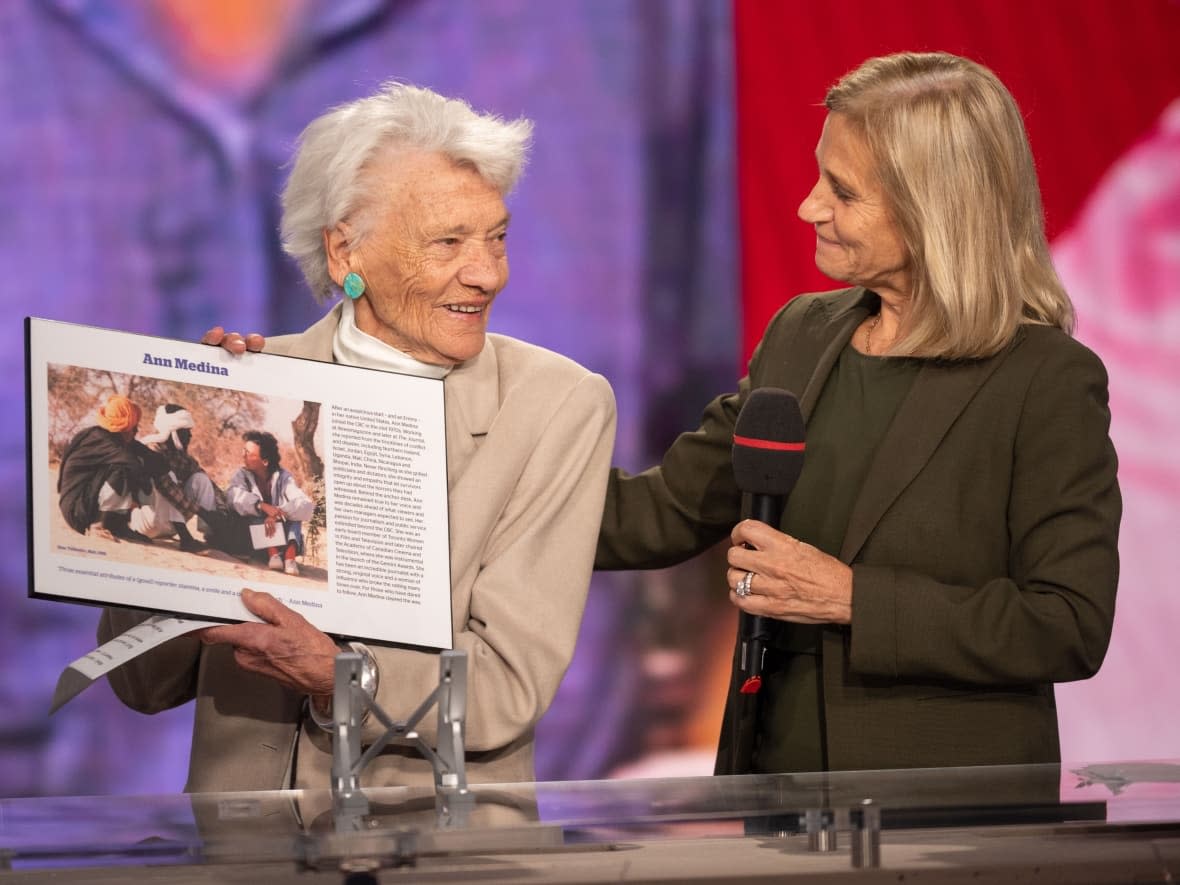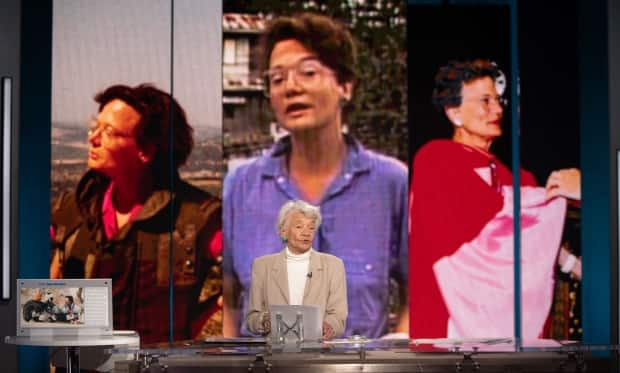Ann Medina inducted into CBC News Hall of Fame

Broadcast journalist, host, Emmy winner, prolific war correspondent and iconic face of Canadian news coverage for decades Ann Medina was inducted into CBC's News Hall of Fame on Monday.
In a ceremony that included her family and was hosted by CBC journalists Nahlah Ayed and Adrienne Arsenault, Medina became the ninth member of the Hall of Fame since its creation in 2014. She was chosen for being "a woman of influence who broke the ceiling many times over," a plaque honouring her contributions read.
"For those who dared to follow, Ann Medina cleared the way," it concluded.
Medina, who was present at the ceremony, grew up in New York City and initially studied philosophy before beginning her career in journalism in Chicago in the 1960s as a reporter. Soon after she became a network producer for NBC News, and then a correspondent and producer for ABC News.
After a winning two Emmys while in the United States, she moved to Canada to marry journalist and radio operator Jack McGaw. The two met in 1974 when, as a correspondent for ABC, Medina was sent to Ottawa to cover a non-confidence vote for then-prime minister Pierre Trudeau's government, with McGaw as her producer.
WATCH | Ann Medina reports from Syria 39 years ago:
They married the following year, just before Medina was hired by CBC to work on News Magazine. The two amicably separated eight years later, with "the only point of contention [being] Max, our parrot," she told the Globe and Mail for McGaw's 2012 obituary. Medina, who has had a lifelong love for birds, kept the animal.
She soon made a name for herself as journalist who humanized subjects from all walks of life, on all parts of the planet — reporting from places as various as Egypt, Syria, Jordan, Mali, China, Nicaragua and more during her long career at CBC.
She moved to successor current affairs and documentary program The Journal after News Magazine's cancellation, and extensively covered the civil war in Lebanon — under and around mortar shells and bullet rounds.
Her reports from out of the war zone helped to inform a generation of Canadians about the conflict, with a raft of stories that often went deeper than any contemporaries in the region.
"Ann Medina became a national superstar, proving two things we should take a way from this: one, back your journalists. Two, if you build it, they will come," Canadian journalist Mark Starowicz, former executive producer of The Journal, said at the ceremony.
"Ann Medina thrived because of the fundamental journalism — her skill — and her sympathy for the human condition."
LISTEN | Medina explains what to pack when reporting overseas:
"Your gutsiness, your realness, was for someone like me a permission slip, to let me believe I could try and it might be OK," Arsenault added, referring to Medina as "the baddest of badasses to ever grace this place."
"You kicked down the doors for us," she continued. "And I promise you, we will stand in those doors, and we'll hold those hinges tight, and we will keep them tight. Not just for them, but for you."
'I was fired and now this. It's just nuts!'
The Journal — which debuted with two women as hosts and no male co-host, a first in Canada — ended in 1992 after the death of host Barbara Frum and was merged with the program The National. Medina had already partially transitioned to another program, Saturday Report, as a host in 1986 — though her three-year contract was ended both prematurely and controversially, only six months after she began.
"I can only say I am totally overwhelmed by all of this," Medina said at the Monday ceremony when accepting her induction. "And you just heard — I was fired and now this. It's just nuts!"
Medina went on to thank CBC and the selection committee for the honour, before speaking on the importance of journalistic integrity, and trust built between broadcasters and their audiences.

As a journalist herself, she said, she always strived to share what she had seen and what she knew — never what she felt. She said there's a growing risk of audience alienation due to political decisions, from both the left and right sides of the spectrum, leaking into news.
She said those decisions can find, and have found, their way into news through both biased reporting, and decisions made behind the scenes. And when audiences feel influenced by those decisions, she said, it breaks trust between them and the world of journalism.
"CTV betrayed that trust when it fired Lisa LaFlamme," Medina said, referring to the longtime news anchor's contract termination earlier this year. "And I believe CBC betrayed that trust when it fired The Journal."
"These days we're seeing how precious that trust can be to the very fabric of democracy," she continued.
In giving advice to future journalists, Medina said they need only a few things: stamina, a smile that can connect with "the person who is behind, what I call, their costumes," and a cast iron stomach — which, she said, made her one of the few foreign correspondents at The Journal to never get sick ("I will always thank my mother for letting me eat dirt," she added).
Finally, she said, you need "an enabler" — a supportive home to offer resources, and protection for a curious mind to gather and share stories.
"I am here because CBC allowed me to be a reporter," she said. "CBC gave me the freedom to be a reporter."


